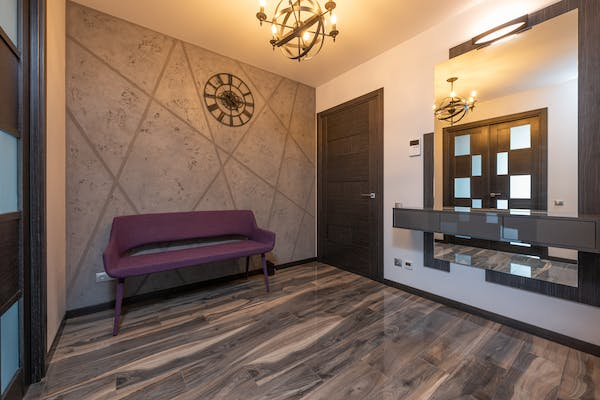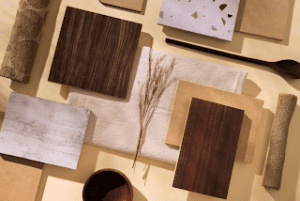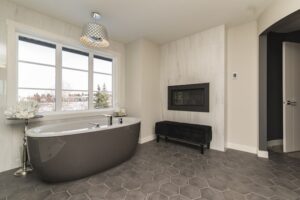Thinking of renovating your floors? Vinyl might be the first option that pops into your head. This is because vinyl is one of the leading options in the flooring industry. It offers various types of flooring, including LVT (Luxury Vinyl Tile), LVP (Luxury Vinyl Plank), and vinyl sheets. Another exceptional type is EVP flooring. Engineered Vinyl Plank (EVP) Flooring is also a common option due to its exceptional durability against spills, dents and scratches.
You might have tons of questions about EVP flooring. As a result, we have written this guide to answer everything you need to know about EVP flooring.
Let’s dive in.
Table of Contents
ToggleWhat Is EVP Flooring?
Engineered Vinyl Plank flooring is an excellent product that looks beautiful and offers excessive durability. This type of vinyl plank flooring looks exactly like hardwood or stone. EVP flooring is also the same as rigid-core vinyl plank flooring.
From its amazing aesthetics, affordable prices, and simple installation and maintenance to high durability, water resistance and amazing sound absorbability, EVP has become the go-to flooring option for commercial and residential owners.
It is made up of several layers, which makes it strong and durable. Here is what it is engineered vinyl planks are made up of:
Core Layer
The core layer is the innermost layer of EVP, comprising a thick composite. The composite can be SPC (filled with limestone, which is great for heavy-traffic areas like commercial spaces). It can also be filled with WPC (wood flour made of sawdust, which increases comfort, insulation and soundproofing). This flooring’s core layer is rigid vinyl, making the product thick and strong.
Design Layer
The second layer of an engineered vinyl plank is the design layer. This gives it a realistic look. The design layer consists of embossed texturing to imitate the look of real wood. This layer gives EVP its textured vinyl look, increasing the place’s aesthetics.
Wear Layer
The topmost coating of an engineered vinyl plank is the wear layer. This transparent plastic layer protects it against heavy duty and increases longevity.
How To Install EVP Flooring?
Engineered luxury vinyl plank flooring installation is easy and affordable compared to hardwood. There are several ways to install EVP floors, including
- Floating floor
- Glue down
- Peel and stick
- Loose lay
The floating floor is one of the easiest, cheapest and most beneficial installation methods of EVP flooring. As its name suggests, a floating floor is achieved by clicking the different engineered vinyl planks together like a puzzle so that the floorboards attach together firmly, creating a smooth and beautiful surface.
So, let’s look at how you can install EVP flooring using this method.
Materials Needed:
- EVP flooring planks
- Underlayment (if not pre-attached to the planks)
- Spacers
- Rubber mallet
- Adhesive (if required)
- Safety equipment (gloves, knee pads, eye protection)
- Measuring tape
- Utility knife or a fine-toothed saw
- Tapping block
- Pry bar
- Transition moldings (if needed)
Now, let’s look at its installation steps.
Preparation
The first step is to remove the flooring from their boxes for atleast 48 hours so that they can acclimate to the room’s humidity. This will let the planks adjust according to the room’s temperature and prevent them from expanding after installation.
Meanwhile, ensure that the subfloor is prepared. Remove any existing flooring or debris. Clean, dry and level the flooring to start the installation. Although EVP floors are waterproof, check for moisture if you’re installing on a concrete surface. Use a moisture barrier to prevent your EVP from it.
Underlayment
Most EVP floor comes with an underlayment attached to it. All you have to do is lay the planks, as there is no need for adhesives or other underlayment. However, if, in some cases, the planks do not have an underlayment, you’ll need to roll out one according to the manufacturer’s instructions. This will make the surface smooth and also offer sound absorption.
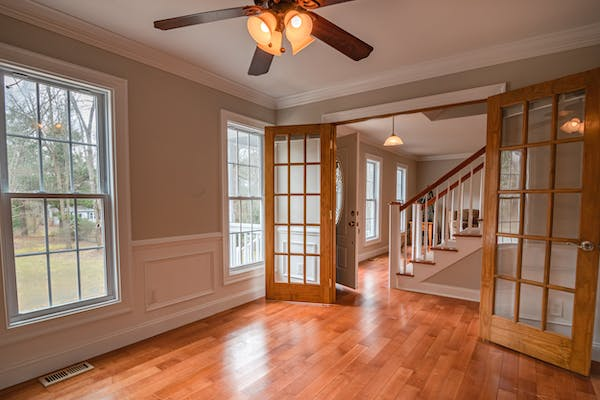
Plan The Layout
Planning the layout before you finally start laying the engineered vinyl planks is important. Decide before time which direction you want your planks to be laid. Installing them parallel to the longest wall is often recommended for a visually pleasing effect.
Start Laying The First Plank
Start placing the planks on the first row. Install the first plank with its tongue facing the wall. Insert the tongue of the second plank in the groove of the first one and continue until you reach the end of the row. For the last plank in the row, measure the distance left and cut a plank according to the calculation. Use a jigsaw, circular saw, or miter saw to cut the planks and ensure you are wearing safety gear.
Place spacers between the plank and the wall to create an expansion gap (usually around 1/4 inch). Use tapping block and mallet as needed.
Install the Following Rows
Start the first row with a piece you cut from the first row to ensure that the end joints give a staggering pattern by at least 6 inches for a more stable and attractive look.
Continue laying the flooring by connecting the planks’ tongue and groove and using the tapping block and mallet as needed. Don’t forget to leave a little gap along the walls and planks for expansion.
Make Sure To Cover the Floor Around Obstacles
Cut the planks accordingly to cover obstacles like vents and doorframes. You may need to use a template or make several smaller cuts to achieve the desired shape.
Do The Finishing Touches
After laying the entire EVP flooring, remove the spacers to install baseboards or quarter-round moulding to cover the expansion gap. Don’t forget to place the transition strips at doorways or other transitions.
Conduct Final Inspections
The last step of installing an EVP floor is walking over the entire floor to spot loose or raised planks. If there are any, fit them using the tapping block and mallet.
Note: Every vinyl flooring brand has a different set of installation instructions. Therefore, following the guidelines written on the box of your flooring is necessary. If you’re struggling to install it through DIY, hire a professional to make the flooring smooth and long-lasting.
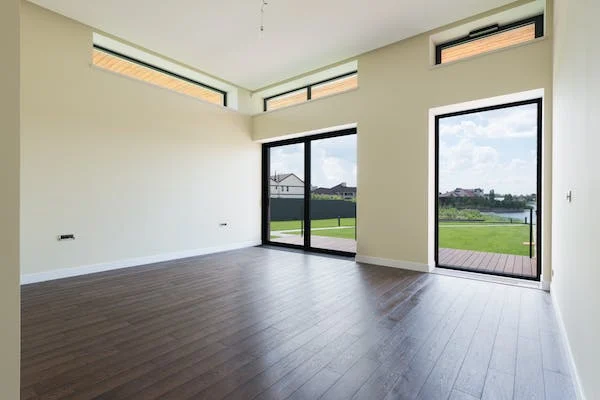
EVP Flooring Pros And Cons
Like every other flooring type, EVP floors have several pros and cons. Let’s look at them so that it’s easier to analyze whether it is worth buying.
Pros
Here are some of the pros of EVP flooring.
Affordable
Money is the biggest factor when it comes to picking a flooring option. Although you will deeply consider type, design, material and other factors, your ultimate decision will boil down to affordability.EVP flooring is one of the most cost-effective flooring solutions. You can get the feel of real hardwood at an economical price. EVP floors go easy on the pockets not only while buying them but also while installing them.
Durability
This type of vinyl flooring is super rigid and durable. Their core layer comprising of thick composite(especially the stone core engineered vinyl plank) provides it stability, firmness and longevity against heavy traffic.
Easy Installation
There are several easy installation ways of EVP, which are all easy and affordable. Every engineered vinyl plank installation method is simple, from glue down and loose lay to click and peel and stick. You can even DIY it by reading the manufacturer’s guidelines and instructions.
Loads Of Options
EVP flooring comes in several options, designs, colours, patterns and textures. The wood and stone composition in engineered vinyl planks can be moulded into a pattern you desire. Whether you want the look of ash, slate, ebony, or pine, it can mimic it.
Waterproof
Are you sick of posting polls on social media to know which flooring type is waterproof? Install EVP as it is completely water and moisture-resistant. As a result, you don’t have to worry about your floor swelling or damage due to occasional spills or splashes.
Easy To Clean And Maintain
Another plus point of this type of vinyl is that it’s easy to clean and maintain. Its topmost coating protects the floor from staining or absorbing dirt. All you need is a wet mob and a mild detergent to wipe off dirt and garbage.
Covers Minor Defects
Before installing flooring, it is necessary to clean, dry and flat the subfloor to give a smooth and visually appealing look. However, many people forget this or are unable to prepare the subfloor due to imperfections. This results in uneven flooring installation. EVP flooring can prevent this from happening due to its rigid self-levelling underlayment, which evens out the floor itself, giving a flawless look.
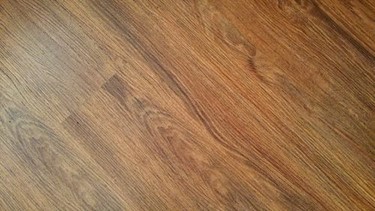
Comes Usually With Underlayment
Engineered vinyl planks usually come with an underlayment, which saves money, effort and time. All you need to do is remove the existing flooring and start installing the EVP. The underlayment is made from a hard material like cork or rubber, offering underfoot cushioning, soundproofing, and subfloor levelling.
Cons
Here are some of the cons of EVP flooring.
EVP Flooring Might Decrease Your House’s Resale Value
As a rule of thumb, a property’s value increases if it has expensive material installed in it. Therefore, the resale value might drop since EVP floors are not so expensive compared to tile, hardwood or stone.
Not So Eco-Friendly
A downside of EVP flooring is that it is not so eco-friendly as they are made from unnatural material like hard plastic and rubber. These materials are extremely toxic to the environment not only when manufactured but also long after they are made. Many EVP flooring emits VOC, which are carcinogens that can have adverse effect on humans and other living organisms.
EVP Flooring Is Not UV-Resistant
Although EVP flooring comes with a protective layer, it is not UV-resistant. Engineered vinyl plank flooring can fade in the long run if exposed to the sun.
EVP Cannot Be Refinished
Since EVP flooring is super rigid, it cannot be refinished if you damage an engineered vinyl plank. This means that you’ll have to replace the entire plank, which can be difficult, depending on your installation method.
Sometimes DIY In EVP Flooring Can Turn Out To Be A Mess
Installing complex and heavily patterned EVP floors through DIY can be a total headache. You might think it’s easy at first, but once you start doing it, you’ll realize it’s confusing, time-consuming and back-breaking. Therefore, hiring a professional is best to achieve flawless, staggering and visually appealing engineered vinyl flooring.
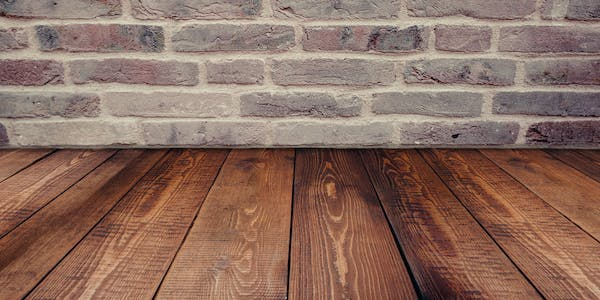
Engineered Vinyl Plank vs. Luxury Vinyl Plank
A common question asked by several people is, what’s the difference between engineered vinyl plank and luxury vinyl flooring? Although both flooring types are made from the same material, there are still major differences between them.
Engineered vinyl plank flooring is made from a thick composition of stone or wood flour in its core. It has several layers, making EVP rigid, strong and waterproof. This makes EVP flooring firm against heavy traffic and durable.
However, luxury vinyl plank is thinner as compared to EVP as it does not have excessive composition and layers. As a result, LVP flooring is not as strong, durable and waterproof as EVP.
Moreover, EVP flooring installation is much easier than LVP. This is because they are stone-cored engineered vinyl planks. Once they are laid and clicked together, they remain stable for years due to their hard nature. This is not the case with LVP flooring, as it is thin and lightweight, making it difficult to install and keep stable in the long run.
Best EVP Flooring Brands
After deeply studying EVP flooring, you might be interested in installing it. But are you struggling to find the perfect brand? Relax, let us help you. Although several EVP flooring brands exist, choosing one can be difficult as many are not up to the mark. Here are some of the best EVP flooring brands.
COREtec Flooring
A great brand for EVP flooring is COREtec flooring. Owned by Shaw Industries (the second largest manufacturer in the world), COREtec comprises a huge variety of Engineered vinyl planks. COREtec offers highly rigid, durable and waterproof EVP flooring. COREtec’s incredible flooring looks absolutely gorgeous wherever it is installed.
Lowe’s
Lowe’s is one of the leading brands in the world when it comes to flooring. They have a wide variety of flooring, all top of the mark. Their SmartCore EVP flooring is no less. It is available in two types including.
- SmartCore Ultra (which has an SPC core)
- SmartCore Pro (which has a WPC core)
SmartCore has exceptionally engineered luxury vinyl flooring, which comprises a thick composite of stone or wood core, making it hard and rigid. It is moisture and water-resistant, making it fit for residential and commercial use.
Proximity Mills
Proximity Mills is the best EVP flooring brand in the entire market. Its luxury-engineered vinyl flooring offers everything you need on an EVP floor. They have a stone-core engineered vinyl plank, which makes the EVP strong and rigid. Its wear layer is made from polyurethane ceramic bead technology, making the flooring durable against heavy traffic. The surprising part about Proximity Mill’s EVP flooring is that it is incredibly inexpensive. This brand is no less than a blessing as it offers high-quality EVP flooring at such a low rate.
Newton
Another stellar EVP flooring brand is Newton. If you want a budget-friendly flooring solution, Newton is the right choice. Its engineered vinyl plank flooring with stone core is inflexible, strong and lasting.Their multi-layer EVP floors do not compromise on quality as they deliver long-lasting results.
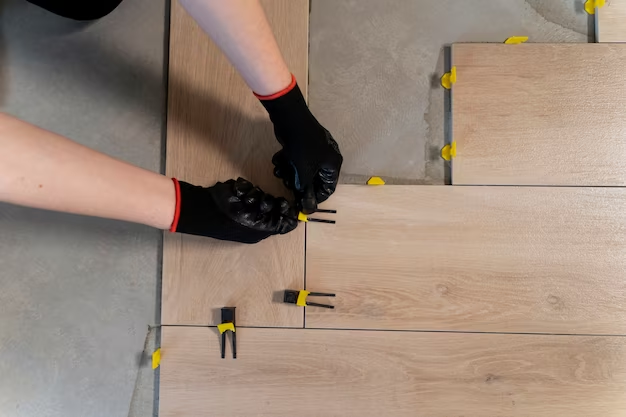
Conclusion
EVP flooring is great if you’re looking for something that depicts real stone or wood at an affordable price. EVP floors not only give your living or commercial space a luxurious feel but also ensure longevity.Its rigid core with a thick composite makes it durable against heavy traffic and water-resistant. Its easy-to-install and maintain quality makes it a popular choice amongst the masses. However, choosing the right EVP flooring brands is necessary to get the best quality EVP flooring in the market.
Frequently Asked Questions (FAQs)
Here are some frequently asked questions about EVP flooring.
What is the difference between EVP and LVP flooring?
EVP flooring has a thick core with stone or wood composite. Its excessive layers make the planks rigid,strong, durable, and water resistant. EVP flooring is easy to install and maintain. It is a long-term solution as its inflexible planks are difficult to move once they are clicked together. Whereas LVP flooring is comparatively thin and does not have thick composites. It is not as long-lasting or rigid as EVP flooring due to its thin composition.
Does EVP flooring scratch easily?
No, EVP flooring doesn’t scratch easily due to its protective layer, which makes it scratch and dent-resistant.
How long does EVP flooring last?
Due to its strong and rigid nature, EVP flooring lasts over thirty years. Its thick composition and multi-layer design make it durable. However, a little maintenance and care can ensure the longevity of your EVP flooring.
How much does EVP flooring cost?
EVP flooring costs around $4-$6 per square foot. It is slightly more expensive than LVP flooring, but that’s because of its high durability. However, it is still way cheaper than real hardwood or stone and depicts their appearance.
Is EVP the same as laminate?
Not exactly, but it can be said that EVP is a hybrid between laminate and LVP flooring. The core layer is the main thing that separates them.

